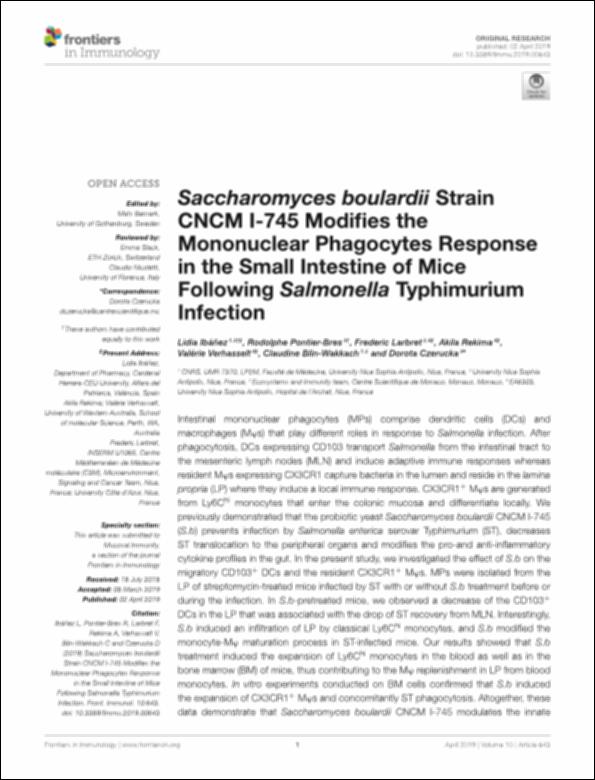Please use this identifier to cite or link to this item:
http://hdl.handle.net/10637/13358"Saccharomyces boulardii" strain CNCM I-745 modifies the mononuclear phagocytes response in the small intestine of mice following "Salmonella" typhimurium infection
| Title: | "Saccharomyces boulardii" strain CNCM I-745 modifies the mononuclear phagocytes response in the small intestine of mice following "Salmonella" typhimurium infection |
| Authors : | Ibáñez Torres, Lidia Pontier-Bres, Rodolphe Larbret, Frederic Rekima, Akila Verhasselt, Valérie Blin-Wakkach, Claudine Czerucka, Dorota |
| Keywords: | Saccharomyces boulardii - Uso terapéutico.; Saccharomyces boulardii - Therapeutical use.; Communicable diseases - Immunotherapy.; Enfermedades infecciosas - Inmunoterapia.; Salmonella Typhimurium - Treatment.; Probiotics.; Intestinos - Inmunología.; Intestines - Immunology.; Salmonella Typhimurium - Tratamiento.; Probióticos. |
| Publisher: | Frontiers Media |
| Citation: | Ibáñez, L., Pontier-Bres, R., Larbret, F., Rekima, A., Verhasselt, V., Blin-Wakkach, C. & Czerucka, D. (2019). "Saccharomyces boulardii" strain CNCM I-745 modifies the mononuclear phagocytes response in the small intestine of mice following "Salmonella Typhimurium" infection. Frontiers in Immunology, vol. 10, art. 643 (02 apr.). DOI: https://doi.org/10.3389/fimmu.2019.00643 |
| Abstract: | Intestinal mononuclear phagocytes (MPs) comprise dendritic cells (DCs) and macrophages (M0s) that play different roles in response to Salmonella infection. After phagocytosis, DCs expressing CD103 transport Salmonella from the intestinal tract to the mesenteric lymph nodes (MLN) and induce adaptive immune responses whereas resident M0s expressing CX3CR1 capture bacteria in the lumen and reside in the lamina propria (LP) where they induce a local immune response. CX3CR1+ M0s are generated from Ly6Chi monocytes that enter the colonic mucosa and differentiate locally. We previously demonstrated that the probiotic yeast Saccharomyces boulardii CNCM I-745 (S.b) prevents infection by Salmonella enterica serovar Typhimurium (ST), decreases ST translocation to the peripheral organs and modifies the pro-and anti-inflammatory cytokine profiles in the gut. In the present study, we investigated the effect of S.b on the migratory CD103+ DCs and the resident CX3CR1+ M0s. MPs were isolated from the LP of streptomycin-treated mice infected by ST with or without S.b treatment before or during the infection. In S.b-pretreated mice, we observed a decrease of the CD103+ DCs in the LP that was associated with the drop of ST recovery from MLN. Interestingly, S.b induced an infiltration of LP by classical Ly6Chi monocytes, and S.b modified the monocyte-M0 maturation process in ST-infected mice. Our results showed that S.b treatment induced the expansion of Ly6Chi monocytes in the blood as well as in the bone marrow (BM) of mice, thus contributing to the M0 replenishment in LP from blood monocytes. In vitro experiments conducted on BM cells confirmed that S.b induced the expansion of CX3CR1+ M0s and concomitantly ST phagocytosis. Altogether, these data demonstrate that Saccharomyces boulardii CNCM I-745 modulates the innate immune response. Although here, we cannot explicitly delineate direct effects on ST from innate immunity, S. b-amplified innate immunity correlated with partial protection from ST infection. This study shows that S.b can induce the expansion of classical monocytes that are precursors of resident M0s in the LP. |
| Description: | Este artículo se encuentra disponible en la siguiente URL: https://www.frontiersin.org/articles/10.3389/fimmu.2019.00643/full |
| URI: | http://hdl.handle.net/10637/13358 |
| Rights : | http://creativecommons.org/licenses/by/4.0/deed.es |
| ISSN: | 1664-3224 (Electrónico) |
| Issue Date: | 2-Apr-2019 |
| Center : | Universidad Cardenal Herrera-CEU |
| Appears in Collections: | Dpto. Farmacia |
Items in DSpace are protected by copyright, with all rights reserved, unless otherwise indicated.


